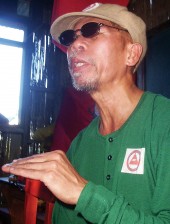Martial law helped NPA, says reb leader

JORGE MADLOS, spokesperson of the National Democratic Front in Mindanao, in this photo taken December 2003 in his then hideout somewhere in Surigao del Sur AFP
DAVAO CITY—At the height of student activism in 1972, a young Jorge Madlos decided it was time for him to quit college in Bukidnon.
By then, classes had been suspended and when they would resume was uncertain.
Madlos, then a graduating engineering student, said as an active student activist, he knew he was among the targets of a military crackdown that started as soon as Marcos declared martial law.
“A week after martial law was declared, we students discussed what to do as classes were suspended and there was prevailing fear in the air,” he told the Inquirer by phone from his hideout recently.
Madlos, who would rise to become one of Mindanao’s top communist leaders, said he decided to go to the mountains with some 100 student-activists.
Article continues after this advertisement“There we joined farmers who were already armed,” he said.
Article continues after this advertisementMadlos said the decision proved to be one of the best he had made as “those who stayed behind were arrested and jailed” by authorities.
“There were so many arrested and some were not seen anymore,” he said.
Since then, the strength of the New People’s Army (NPA) grew as more people, who were fleeing abuses by enforcers of military rule, took up arms.
“So in a glance, you can say that martial law was the promoter of the NPA,” Madlos, now spokesperson of the National Democratic Front in Mindanao, said.
Exactly 30 years since he joined the revolution, Madlos said conditions that drove him to go underground barely changed, the reason he kept his belief in armed struggle.
“I thought we can have our freedom right after martial law was lifted,” said Madlos. Marcos announced the lifting of martial law in 1982 but didn’t yield one-man rule.
“It is still dictatorship without Marcos,” Madlos said as he described the administrations that succeeded Marcos, starting from the transition government of the late President Corazon Aquino, to Fidel Ramos, to Joseph Estrada, to Gloria Macapagal-Arroyo and the second President Aquino.
“There is no difference today,” said Madlos.
He said the country remains beset with extrajudicial killings and forced disappearances of individuals fighting the government.
Madlos said while majority of Filipinos remained poor, the government continues to hand over the country’s natural resources to foreigners, and farmers remain destitute. “That’s why I am still here,” he said.
Madlos’ case is just one of dozens of cases of student activists taking to the hills to become members of the NPA that continues to fight what could be the longest Maoist revolution in the world. Dennis Jay Santos, Inquirer Mindanao